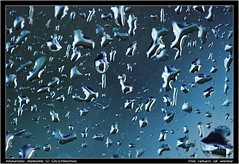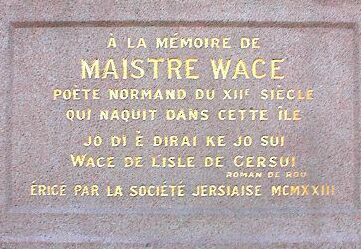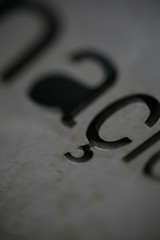 The Société Jersiaise online bookshop has updated its stock listings, and the Jèrriais dictionaries can be ordered online. Buy now while stocks last!
The Société Jersiaise online bookshop has updated its stock listings, and the Jèrriais dictionaries can be ordered online. Buy now while stocks last!Tuesday 31 August 2010
Dictionnaithes - Dictionaries
 The Société Jersiaise online bookshop has updated its stock listings, and the Jèrriais dictionaries can be ordered online. Buy now while stocks last!
The Société Jersiaise online bookshop has updated its stock listings, and the Jèrriais dictionaries can be ordered online. Buy now while stocks last!A short tale about a short tail
Compare:
- chenna (Jèrriais) - ça (French)
- machon (J.) - maçon (Fr.)
- gliaichon (J.) - glaçon (Fr.)
- m'nichant (J.) - menaçant (Fr.)
- r'chu (J.) - reçu (Fr.)
- faichon (J.) - façon (Fr.) - and it is fashion that English has borrowed
Verb conjugations
French verb conjugations sometimes require a verb stem ending in c to take a cedilla in positions where Jèrriais grammar doesn't require it:
- grînchit (J.) - grinça (Fr.)
- annoncit (J.) - annonça (Fr.) (although the Jèrrified verb form annonchit is also available - and a similar situation exists with prononcer/prononchi, giving us prononçabl'ye/prononchabl'ye - prononçable)
- înfluencit (J.) - influença (Fr.)
However, sometimes the cedilla is grammatically unavoidable, especially when dealing with borrowed vocabulary:
- j'înfluençons (J.) - nous influençons (Fr.)
What happens in the future, though, when we want to conjugate one of the few verbs with a stem ending in c? If you favour the form annonchi, for example, then writing j'annonch'chais with a long ch presents no problem. What, though, if you favour the form annoncer? Presumably you could say j'annoncéthai, for example, but don't most people use a long /s/? But how to write it? Lé Jèrriais pour tous gives no specific guidance, but following the rules logically, one would expect to see ç'ç - but would anyone write that, though? We have a future form annonc'sa attested in text of the highest literary register possible. It is simple, but not transparent. What are the alternatives? Comments welcome.
Verb s'gencer/s'genser exists in both spellings, so following that pattern might be one solution.
Fixed forms
Some words and names with cedillas are simply borrowed like that: Français has been borrowed from French like that (although we could just as well spell it Franceis like Wace did), and the Dictionnaire specifically cites the name Françouais under the entry for cédile. The French form Français has, presumably, been preserved under the influence of French as an official language. We've borrowed Provence and Provençal (although Provenche and Provenchais are Jèrrified alternatives).
Borrowings and their alternatives
Some words with cedillas we've borrowed, but we still have native alternatives available.
- soupçon, doutanche (J.) - soupçon (Fr.)
- soupçonner, r'douter (J.) - soupçonner (Fr.)
- rançonner, racater (J.) - rançonner (Fr.)
- commèrçant, marchand, boutitchi (J.) - commerçant (Fr.)
There are a couple of borrowed words with cedillas that have almost completely displaced native Jèrriais words.
- léçon (J.) - leçon (Fr.) (the older term is lichon and its verb lichonner - which survive in the senses of telling-off or rigmarole, but the French form has displaced the Jèrriais form in education, probably due to obligatory French in schools and the exclusion of Jèrriais)
- garçon (J.) - garçon (Fr.) (the French word has almost entirely replaced the Jèrriais word hardé - un hardé, des hardgieaux - although the feminine equivalent hardelle has survived a little better against the claims of fil'ye)
Odd ones out
Some prominent French words with cedillas have no related equivalents in Jèrriais (they may be recent developments for which Jèrriais has developed its own vocabulary, separate from any common ancestor).
halître (J.) - gerçure (Fr.)
craûle, chôl'ye (J.) - balançoire (Fr.)
côtchiéthe (J.) - façade (Fr.)
drâses (J.) - caleçon (Fr.)
ain (J.) - hameçon (Fr.)
Saturday 28 August 2010
La langue normande aujourd’hui
Conférence à Porbail mardi 31 août, église Notre-Dame à 21 h.
La langue normande aujourd’hui par Rémi Pézeril
Faut-il parler de patois ou de langue ? Quel est l’avenir de ce « loceis » normand ? Le déclin est-il irréversible ? La conférence s’adresse autant « és syins qui prêchent byin » qu’à ceux qui veulent découvrir ces mots savoureux que l’on entend encore sur les marchés de la région.
Invité par Michel Foliot et l’association culturelle de Porbail, Rémi Pézeril présentera les auteurs classiques de Guernesey, Jersey et du Cotentin jusqu’au Pays de Caux, mais surtout les petits nouveaux qui écrivent dans « le trige » de Bricquebec et Carteret, et ils sont nombreux : Guy Pichon, Mireille Gattepaille, Antoinette Grisel, Joël Hallet, Jean-Philippe Joly, Alphonse Allain et Alphonse Poulain…
Les thèmes se sont diversifiés : humour, amour, nature, poésie et chansons. Nous en écouterons quelques unes pour illustrer le propos.
Président de l’association Magène qu’il a fondée avec Marcel Dalarun et Daniel Bourdelès, et qui a édité 12 CD de chansons en normand, Rémin Pézeri (prononciation normande !) anime itou le groupe de passionnés de langue normande des Amis du Donjon de Bricbé et assure depuis trente ans une initiation facultative dans les collèges tel celui des Pieux (prononcez Les Puus). Depuis dix ans aussi, il assure une chronique sur France-Bleu-Cotentin le dimanche midi.
Les nombreux projets à paraître seront présentés : le dictionnaire français normand (28 000 mots), le nouveau CD Magène « La dentelyire » avec Théo Capelle, Manuela Lecarpentier, Jean-Louis Dalmont et Dany Pinel, un nouveau livre de poésies de Marcel Dalarun, et un livre de récits d’Alphonse Poulain…
Des langues et des noes - Titbits
Literally this phrase means "the crossroad of the wolves". Quite what wolves have to do with it is unclear, but it refers to the sort of place where people's paths cross, where you bump into loads of people you know.
la fête des tchoeurs = crowded streets in Town
This is another phrase referring to groups of people. Literally it means "the festival of cherries". An alternative version is la foule des tchoeurs = the crowd of cherries. This refers to time past when fruit-growing was especially important in Jersey. Besides the omnipresent apple orchards, quantities of cherries were cultivated and, when they came to market in Saint Helier during the month of July, crowds of people would flock to buy them. So if you want to remark on how crowded the streets are at any time of year, this is an expression to use.
While we're on the subject of crowds... A good word for a crowd of people you have to fight your way through is la brouiole. It's a word from the East of the Island, and a pronunciation tip is to think of saying it like "brew-yoll". Another word (actually it may be the same word originally only from the West) is la brouoille (think of saying it in one syllable like "br-woy") which is chaos, hurly-burly or a chaotic crowd.
Friday 27 August 2010
La Lettre Jèrriaise 21/8/10
Du niolîn sus 103 - nonsense on 103
Dictionary addenda
(Source: Chronique de Jersey 8/1/1916)
Related to: patruflyîn
La Section de la langue Jèrriaise
Our reviews continue slowly and it is a pleasure to report the gift of a beautiful book from Collette Quinn which can serve as an example for us.
It is a beautifully written and illustrated book with prose and poetry which includes chapters in French, Norman and English on all sorts of personal observations about life in La Manche in ‘temps passé’ or ‘d’âotefeis’.
It is entitled ‘Moi Denise, fière villageoise de la Manche d’âotefeis’ by Denise Véron-Hambye who has sent us her poems in Norman and contacted us several times since she learnt that Jèrriais existed and was still spoken here. Copies cost 25€, which is c. £20 at today’s rate, but well worth it for 311 pages of the language and history of everyday life in an area adjacent to Jersey…. well indexed and with a lexicon of 83 pages of Norman spoken around St. Denis-le-Gast and the surrounding area.
Another communication came from a researcher, Anna Ciecko at the Sorbonne, who wants to research the use and changes in Jèrriais over the years and compare them with Norman. Needless to say we will help both authors in everyway we can.
The incorrect pronunciations continue and accents are omitted left, right and centre….so no progress there!
Our next meeting will be on Wed next, 1st. Sept. in the AM Room to continue our literature classification and try our hand at more composition.
Tchi cliaque dg'ieau! What a drenching!
 La Ville fut êcliûsée hièr. Nou s'pitouoillait par les c'mîns, et les vaituthes 'taient quâsîment des DUKWs!
La Ville fut êcliûsée hièr. Nou s'pitouoillait par les c'mîns, et les vaituthes 'taient quâsîment des DUKWs!J'eûnmes eune dêtchèrque l'arlévée et bétôt y'eut un dêbordément d's êgouts. Y'avait des boutiques dé n'yées et bein dé d'gâts. Et la tèrre est toute racliatchie.
- rain = la plyie
- to rain = tchaie d'la plyie
- quantity of water = eune cliaque dg'ieau, eune cliapée dg'ieau
- downpour = eune dêtchèrque, un raclia, un abat-dg'ieau, un sotchet, eune dêcliatchie
- flooded = êcliûsé, înnondé
- flood = înnondâtion
- overflow = dêbordément
- waterlogged = racliatchie
- wade (through water) = s'pitouoilli
- drown = n'yer
- a soaking = eune daûtchinne, eune trempeuse, eune chîlée
- mop up = êbaûchi, vatonner
Thursday 26 August 2010
The Making of King Arthur
 Un întèrrêssant progranme dans la saîson Nouormande sus la BBC: The Making of King Arthur. Nou pâle d'l'împortance dé Wace et dé s'n ajouôtage d'la Ronde Tabl'ye à l'histouaithe. Nou mouontre un mannuscrit du Roman dé Brut, tch'est au Collège d's Armueûthies à Londres. Mais nou n'dit pon qu'Wace 'tait d'Jèrri, ni qu'il êcrivait en Nouormand. Et nou dit qu'il avait nom Robèrt! Èrèrgardez l'progranme en lîngne.
Un întèrrêssant progranme dans la saîson Nouormande sus la BBC: The Making of King Arthur. Nou pâle d'l'împortance dé Wace et dé s'n ajouôtage d'la Ronde Tabl'ye à l'histouaithe. Nou mouontre un mannuscrit du Roman dé Brut, tch'est au Collège d's Armueûthies à Londres. Mais nou n'dit pon qu'Wace 'tait d'Jèrri, ni qu'il êcrivait en Nouormand. Et nou dit qu'il avait nom Robèrt! Èrèrgardez l'progranme en lîngne.The BBC programme on the development of the Arthur legend managed to give due weight to Wace's importance, but didn't mention that he was a Jerseyman, or that he wrote in Norman, and repeated the discredited idea that his name was Robert. Apart from those lapses in research, it's an interesting and provocative programme.
"Poet Simon Armitage traces the evolution of the Arthurian legend through the literature of the medieval age and reveals that King Arthur is not the great national hero he is usually considered to be. He's a fickle and transitory character who was appropriated the the Normans to justify their conquest..."
Wednesday 25 August 2010
Félicitâtions! Congratulations!

Monday 23 August 2010
Les vacanches sont à finni....
Friday 20 August 2010
Lé Sâbre à Danmocliesse
Thursday 19 August 2010
La Fèrme - èrmèrcîments

Wednesday 18 August 2010
L'Assembliée d'Jèrriais - Réunnion d'août
Monday 16 August 2010
La Lettre Jèrriaise 14/8/10
Sunday 15 August 2010
La Fèrme, La Trinneté
Thursday 12 August 2010
Les Lèrmes d'Saint Louothains

Au mais d'août nou peut vaie eune achie d'êtailes tchiyants nommée les Pèrseids au jourd'aniet mais tchi soulait êt' connu souos l'nom des "Lèrmes d'Saint Louothains". Tout chein tchi faut pour les vaie est eune tchaise dans l'gardîn et pas d'nuages! Nou peut en vaie jusqu'à 100 à ces sé... daigts crouaîsis pouor un ciel cliai!
La Lettre Jèrriaise 7/8/2010
La Batâle dé Flieurs 2010

Aniet ch'est la Batâle dé Flieurs, et l' temps est parfait - pon trop caud, auve eune petite brise du vouet. Faut espéther qu'i' reste d'même pouor montrer au mus tout l'travas fait par tant d'monde ches dreins mais.


